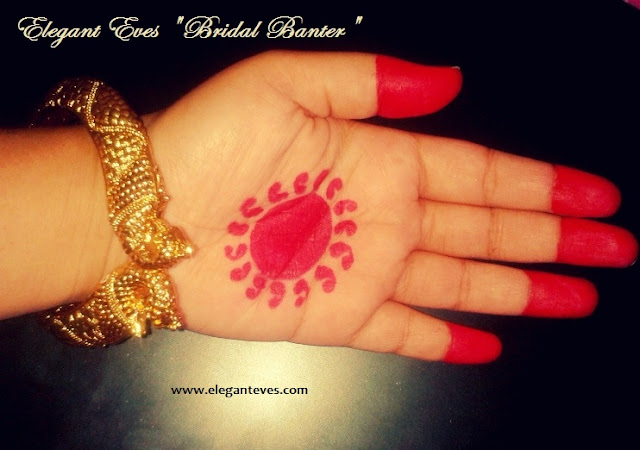The “Aalta” allure……
Before
I begin this piece, I would like to make it clear that this is not a post for
“comparing” mehendi and aalta. It is just meant to revive the essence of a
beautiful tradition which is having a slow death these days owing to flashy
bridal packages which cater to the notion of “give me more”.
 |
| Bengali Bridal Alta |
What
is ‘Aalta’ or ‘Mahawar’ (As it is known in north or western India) is an
adornment which dates back to the Vedic times. It was a red dye created by
mixing the juice of betel leaves, kumkum and sindoor. You will get references
in Indian mythology about Krishna painting the hands of his lady love with
betel leaf juice, or even if you look at the deity statues made by old
artisans, you will see that the hands of goddesses are painted with red alta
and not mehendi.
 |
| The “Aalta” allure |
This was mostly because historically mehendi does not have its
origin in India, it was a plant flourishing in the Middle-East, Central Asia
and North Africa which was introduced in India by the Islamic invaders. Slowly
the invasions penetrated and the betel juice was replaced by mehendi in the
North-west and North India. Although, truth be told, Aalta is just a red dye
artificially prepared these days just like the henna cones we get in market
which are not exactly “natural”.
 |
| The “Aalta” allure |
As
much as being included in the “Solah-Shrigaar” of the bride as per the ancient
Vedic rituals, aalta continues to be a vital part of the Bengali bridal
trousseau. Even the South Indian women flaunt their alta colored hands and feet
during their traditional dances.
But
unfortunately, these days, owing to huge media manipulation and flashy bridal
packages which seem to sing the song “more more more!!” in terms of designs et
al, Bengali mothers are having to face grumbling daughters who whine about
having a mehendi ceremony and covering their hands with dark brown mehendi.
I always love the exchange
of cultures and their ideas but it equally irks me when I see one tradition
dying a slow death because of giving too much attention to the other.
The
vibrant red of aalta signified fertility and if you look carefully, the red
benaroshi saree and those intricate gold jewellery which are THE look for a
blushing Bengali bride would welcome a clean glowing hand with bright red
designs rather than a mehendi wala hand. Nothing against mehendi, it’s just
that the traditional Bengali jewellery designs look MUCH better on pair of
hands with Aalta.
 |
| Photo Credits: Srejon Imagery |
Other plus points of Aalta
include the following:
·
It can be applied within 10
minutes and takes another 5 minutes to dry and you are sorted!
·
It can be applied by anyone
and everyone. You don’t need to spend thousands on a special mehendi-wali
·
Brightens the hands and
provides a perfect glowing canvas for those gleaming gold jewellery and
“Shakha-Paula”(White conch-sell bangle and Red lac bangle-symbol of married
Bengali women)
·
Fades into a pretty pink and
stays maximum for a week. So you don’t have to worry about patchy hands.
 |
| Photo Credit: Srejon Imagery |
Coming
to my decision, even though I am in LOVE with intricate mehendi designs right
from my childhood, I choose to look like a total traditional Bengali bride on
my D-Day. No salon-manufactured look for me ;)
This
post wasn’t a debate on which among Aalta or mehendi is better. A bride should
choose exactly what makes her feel beautiful on her day and be unperturbed by
society, Bollywood and media manipulations. The only point of this post was to
stir up a little love for aalta among the Bengali brides-to be because it is
NOT something to be forgotten, girls! Imagine our mothers’ without that aalta
on pujo or special occasions- unthinkable right? Don’t you wish to look as
ethereal as your mother did on her wedding? J
Ending
this post with my Aalta applied hands (Just one hand because other hand had the
camera L
) Like it? J Please share your views too…. Aalta anyone?
 |
| The Aalta Allure |
Enjoyed reading this? You
will also like these:


0 comments